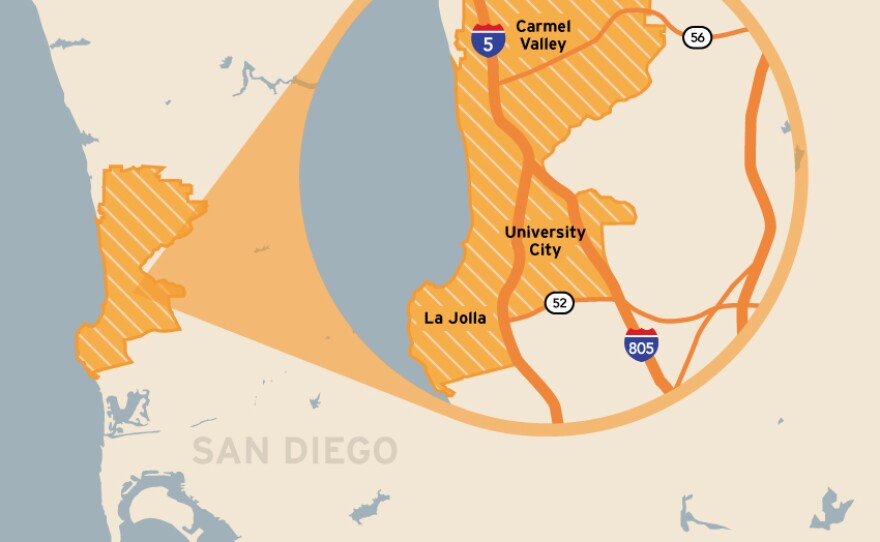The campaigns of Barbara Bry and Ray Ellis, candidates for City Council District 1, exchanged harsh words this week over mailers sent by an independent group attacking Bry for her support of a citizens initiative relating to the city management of tourism assets.
The flier's headline reads: "Barbara Bry & Chargers Agree: DOWNTOWN STADIUM!" But Bry opposes a downtown stadium for the Chargers. She also opposes public funding for a Chargers stadium.
The mailers refer to Bry's support of the Citizens' Plan for San Diego, a proposed November ballot measure that would raise the city's hotel room tax to 15.5 percent from the effective current rate of 12.5 percent. Hotel owners would be allowed to use 2 percent of the tax revenue to market San Diego as a tourist destination. They could also use up to 2 percent to fund a non-contiguous expansion of the Convention Center.
The fliers, funded by the conservative Lincoln Club, also refer to the Citizens' Plan as "Bry's plan." Bry has endorsed the measure backed by attorney Cory Briggs and former Councilwoman Donna Frye, but she was not involved in its crafting.
Bry, a Democrat, said she first saw the flier on Tuesday when it arrived in her own mailbox.
"My first reaction was, 'How can Ray Ellis and his supporters be continuing to lie about something they know is a lie?'" Bry said.
Ellis, a Republican, sent a news release repeating some of the statements in the mailer, as well as statements questioning Bry's support of Proposition B, a San Diego pension reform measure voters approved in 2012. He said in an interview that Bry had previously not been clear on her opposition to a downtown stadium, and that he is the candidate with the best record on pension reform.
"My position has been clear from the very beginning," he said. "The voters overwhelmingly passed Proposition B... and we need to honor the will of the voters."
Proposition B eliminated guaranteed pensions for all city employees except police officers, replacing them with a 401k plan. Bry has said she voted for the measure and supports the City Council's decision to appeal a ruling against the measure. She has said she is open to extending pensions to firefighters and lifeguards, but that she would ultimately leave that decision to the voters.
"I believe we have to look at total compensation packages in order to compete effectively with other jurisdictions," she said at a candidates forum at the La Jolla Community Center on Monday. San Diego has struggled to attract and retain qualified personnel, including police officers and 911 dispatchers. The fire department and lifeguard service face similar problems.
Lincoln Club President Brian Pepin sent an e-mailed statement saying it was disingenuous for Bry to support the Citizens' Plan but oppose a downtown stadium. The Citizens' Plan prohibits public money from going to a downtown stadium, but it creates a legal pathway for one to be built with private money by exempting the project from lawsuits filed under the California Environmental Quality Act.
The Citizens' Plan is separate from the Chargers' own initiative, which would raise the hotel tax to 16.5 percent and give a portion of that revenue to fund a joint Convention Center expansion and football stadium. Both Bry and Ellis oppose that plan.
Flood of money
The Lincoln Club is funding two political action committees to support Ray Ellis' campaign, with a combined war chest of about $300,000. The money is in addition to the approximately $200,000 in Ellis' official campaign, which is legally prohibited from coordinating with the PACs. Bry had about $111,000 in her campaign fund as of April 23, when the last campaign finance disclosures were filed.

The amount of money raised and spent in District 1 reveals its strategic importance: It is likely to decide the partisan balance of the City Council, which now has a 5-4 Democratic majority.
Ellis faced similar accusations of making false statements when he ran for City Council in 2012. His campaign and the Lincoln Club sent mailers accusing Councilwoman Sherri Lightner, a Democrat, of giving $28 million to city employees in the form of bonuses. The Voice of San Diego fact-checked the mailer, rating it "false." Lightner won re-election in 2012 but cannot run again this year because of term limits.
San Diego allows any candidate who wins more than 50 percent of the vote on June 7 to bypass the November general election. If no candidate wins an absolute majority, the top two vote-getters will be in a November runoff. In District 1, five people are competing but Bry and Ellis are considered the top candidates.







